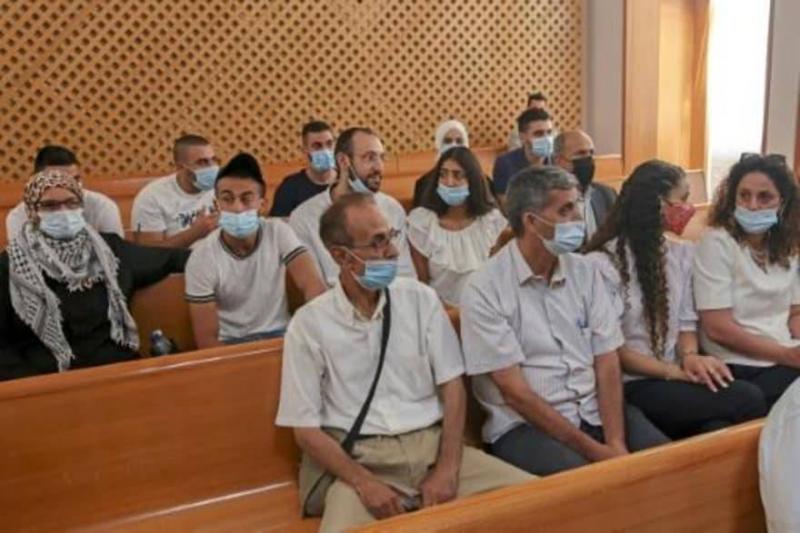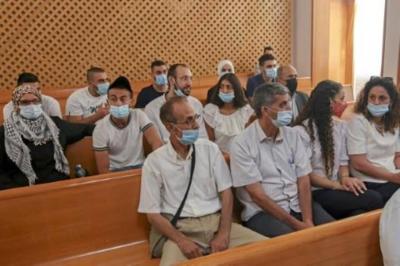The Israeli Supreme Court on Monday postponed its decision on the eviction of Palestinian families from the Sheikh Jarrah neighborhood in occupied East Jerusalem in favor of Israeli settlers, a case that led to deadly escalations last May. The families stated that they rejected the court's offer to remain in the homes "as protected tenants" and pay a symbolic annual rent in exchange for recognizing the settlers' ownership of the properties, as confirmed by Mohammad Kurd, one of those threatened with eviction. Judge Isaac Amit requested more documents and information, noting that the court "will publish a decision later" without specifying a clear date.
Sami Ershid, a lawyer representing the four Palestinian families whose cases were discussed by the Supreme Court on Monday, emphasized their rejection of the court's offer. He stated, "We agree to be considered protected tenants but with the retention of our rights (...) We will request recognition of the property rights granted to us by the Jordanian government." On the other hand, settler lawyer Ilan Sheemer argued that the residents' demands were "not achievable."
Israel occupied East Jerusalem in 1967 and later annexed it, a move not recognized by the international community, which rejects settlements and considers them illegal. The case pertains to the ownership of land on which homes inhabited by Palestinians have been built, which settlers seek to acquire in East Jerusalem. Israeli law states that if Jews can prove that their family lived in East Jerusalem before the 1948 war, they can claim their "right to ownership." However, there is no such law for Palestinians who lost their properties during the war.
Ershid noted that "the session was important and difficult, and the discussion was heated... We hope that the court takes the new documents we submitted seriously." He added, "The issues raised are not simple, and the judges are aware of that, which is encouraging especially since the judges listened to all the claims even those contradicting previous court rulings." Ershid believes that the judges are trying to reach a settlement based on specific legal principles.
The families appealed to the Supreme Court after lower courts ruled to evict them in a lawsuit filed by Israeli settlers. In Israel, with some exceptions, one appeal can only be made to the Supreme Court, which has ruled in favor of eviction in the past. Meanwhile, Jerusalem's Deputy Mayor Aryeh King, who supports the settlers' position, criticized the court's delay, stating to AFP, "If the court continues in this manner, it gives Arabs room to riot."
In a statement, the Palestinian families facing eviction requested that the court accept legal consultation from a legal expert. According to the statement, "The lawyers submitted a request to accept legal consultation from Dr. Ronit Levin Schnur," a law professor and researcher at the Gazit Glob Institute for Real Estate Research. The statement added that Schnur concluded that "the Jordanian government did everything necessary to register ownership of the homes before the June (1967) war but could not complete it due to the war, and that the Israeli government should respect the commitments made by the Jordanian government."
**"Stop the Settlements"**
Outside the Supreme Court, dozens of people gathered, including Knesset members, residents, lawyers, and Palestinian, Israeli, and foreign peace activists on Monday, supporting the Palestinian families and expressing their rejection of Israeli settlement, amid drumbeats and chants, as reported by an AFP correspondent. The demonstrators carried banners some of which read "No to Occupation" and "Stop Settlement in East Jerusalem."
In May, protests supporting the Palestinian residents of Sheikh Jarrah turned into clashes with settlers and Israeli police, sparking confrontations in Israel and the Palestinian territories. Clashes then occurred at the Al-Aqsa Mosque complex between Palestinians and Israeli forces. Subsequently, from May 10 to 21, a violent conflict erupted between Palestinian factions in the Gaza Strip, led by Hamas, which controls the area, and the Israeli army, resulting in the deaths of 260 Palestinians, including children and fighters, and 13 people in Israel, including a soldier, a child, and a girl. The Israeli organization "Ir Amim," which monitors settlement growth in Jerusalem, stated that up to a thousand Palestinians in Sheikh Jarrah and the nearby Silwan neighborhood are at risk of eviction in favor of settlers.




